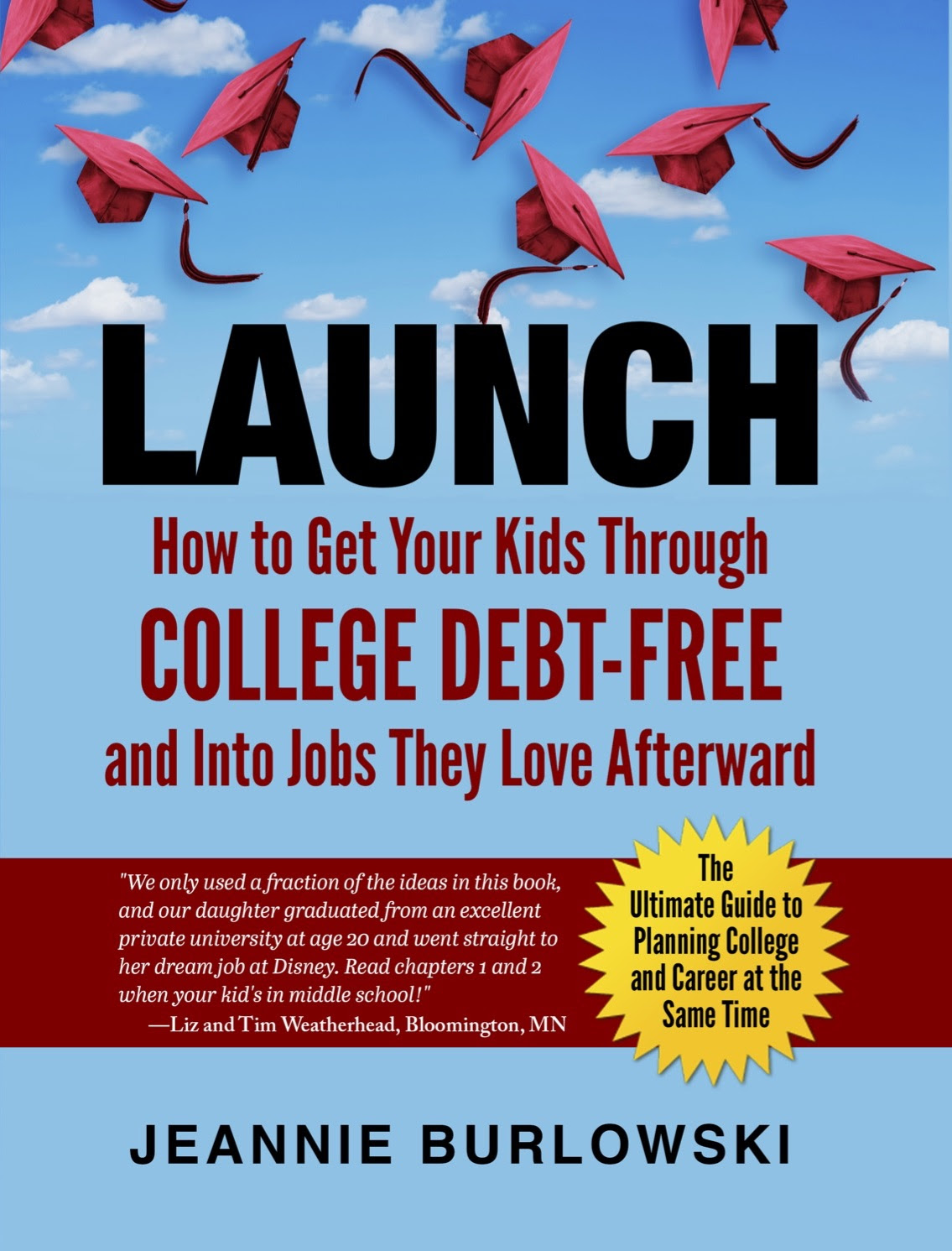This article is for you whether you’ve got a high schooler or a college student experiencing college anxiety.
When Samantha was in 10th grade, her Dad offered her a great suggestion. “Sam, why don’t we get your guidance counselor to sign you up for some college classes for next year, and you take those instead of regular high school classes? You can get real college credit for them, they’ll still count toward your high school graduation, and best of all, our state will pay for them!” Samantha hesitated, nervous apprehension squeezing at her stomach and working its way up to her chest and throat. It was her first experience with college anxiety. “I don’t know, Dad—couldn’t I just take a couple of AP classes instead?”
Don’t let your child retreat into AP classes to avoid college anxiety.
AP classes are the least dependable way to earn college credit in high school.
Contrary to popular belief, AP classes are not typically “easier than real college classes.” Think about it. Would you want to study a subject for months and months, and then have your success or failure depend on performing well on one big test at the end?
And then, after all that work, you find out that the college you’ll be attending may not even accept your hard-won AP credit?
That’s enough to exacerbate even the mildest case of college anxiety.
Here are 5 ways parents can head off college anxiety. (Number 5 is a big one.)
1. Emphasize that college success isn’t about how smart you are, it’s about how organized you are.
Your son is worried that he’s not smart enough for college. All kids are. If you went to college yourself, tell him that you really started being successful at college when you learned to use a calendar and make lists of tasks you had to do. Emphasize that organization is something anyone can learn.
2. Quit saying, “If you don’t go to a good college, you won’t be able to get a good job when you graduate.”
It’s too much pressure. Ease up. That kind of talk just fuels your kid’s college anxiety. Don’t you know people who went to so-called “bad colleges,” and they have great jobs? You’ll want to keep your kid out of “for profit” colleges, and I steer families away from state universities for multiple reasons, but lower ranked private colleges and universities can be fantastic bargain options. Take a look at this Gallup research that shows that elite education doesn’t actually lead to a happier life. You’ll reduce your own college anxiety, as well as your kid’s.
3. Emphasize that colleges want kids to succeed. They provide students lots of help.
Even Harvard has a math center and a writing center for students who want extra help. Professors have office hours where they meet one-on-one with students. Tutors are widely available. If your daughter gets stuck, whether she’s already in college or taking college courses in high school, help will be available.
If your child has a diagnosed disability of any kind, give him or her the greatest chance of overcoming college anxiety; read the helpful article I’ve written here.
4. Tell your kid, “You’ll take a giant leap toward success by simply putting your phone away, pulling out a pen, and taking careful notes in classes.”
Research shows that the average college student wastes 20% of class time playing with electronics during college classes. Your son will race ahead of these people if he will just simply take careful notes in college classes.
5. Allow your kid to take this college study skills class in middle school—or as soon as possible after that. Even senior year of college is not too late.
The most powerful way to head off college anxiety is to have your kid learn high-level college success strategies not taught in high schools as early as possible.
Age 12 is not too early, and age 26 is not too late.
The one-morning college success class I teach on this subject is called THE STRATEGIC COLLEGE STUDENT: How to Get Higher Grades Than Anyone Else While Studying Less Than Most Other People. Subscribe to email updates on this website and then add me to your “safe senders” list using the directions you see here so I can be sure to reach you, and I’ll let you know the next time this class is available.
When I teach this class live, the room is crammed full of students ages 12–26 and their parents. (Yep, all those people, all in the same room, all at the same time.) Your kid will experience less anxiety and more confidence the earlier he or she takes it.
Here’s what one mom had to say about her son taking this class from me:
Jeannie,
My 12-year-old son and I attended one of your seminars three years ago. (Get great grades while working less.) I want to give you feedback about the impact that you have had on my son since.
First, your way of speaking, your excitement, and ability to be clear, concise (in a way that a 12 year-old could understand) prompted him to lean over to me 10 minutes into your class and say that he would be willing to attend your ‘MAKE THEM SAY WOW’ scholarship essay writing seminar. Up to that point he thought I was wasting our money and precious hours of his weekend. Suddenly, he was writing notes and anticipating attending a seminar about essay writing—on a Saturday!
Second, we lingered after the class so that you could see his notes and I could ask a question. I remember he handed his notes to you and commented that his writing was sloppy or something to that effect. You took the notes from him and examined them as if they were 2000 years old and written in gold. That obvious tenderness was not lost on me. Then you said quietly and with genuine awe that his notes were just wonderful and that you did not see many high schoolers with such complete notes. I don’t remember the exact words you used but it made an impact on him. You made him feel like the smartest kid in the city. As parents, my husband and I often find unique ways to compliment an action, a choice, or a comment he has made. He will dismiss it and say that we say it because we love him. Sometimes a stranger can have a much bigger impact on a kid than a parent.
What’s most remarkable about this class, though, is that it’s stuck with our son for the three years since he took it. Recently he had a very difficult transition from private grade school to public high school. It turns out there were several “gaps” in teaching in physical science, math, Spanish and English. (For example, in 9 entire years of Spanish, the private school never once taught him to conjugate a verb.) This was scary and stressful. Ben recognized this almost immediately. He did not panic. He just dug in deep and worked hard. I really believe that Ben’s freshman year would have been a very different experience if he had never been prepped with your seminars. He doesn’t yet utilize all of your suggestions, but he has some of the most important tools down, including a good, confident attitude and a strategic work ethic.
You have had a pretty big role in all of this. I wish you could feel how thankful I am for you!
Remember, getting access to free college courses in high school is only a small part of the picture when it comes to getting your kid through college debt-free.
For clear, step-by-step help with the whole process from beginning to end, get your copy of my book:
Important—> It’s a reference book, so nobody reads the whole thing cover to cover. Pick out what you need to read in it using the fast-paced, 10-minute video instructions here.
You can see hundreds of reviews of this book on Amazon by going to:
You can see why financial advising professionals love LAUNCH, here.
You can see the top 9 questions parents are asking me about LAUNCH, here.
Read just one chapter of LAUNCH every 1–3 months while your child’s in middle school and high school, and you’ll know every viable strategy for debt-free college at exactly the right time to implement it.
And if your child’s already well past middle school? That’s OK; you can run to catch up. But the process of getting your kids through college debt-free goes more smoothly the earlier you start it—especially if you’re not planning to save up any money to pay for college.
Let's you and I walk together toward the goal of debt-free college for your kids.
We can accomplish this no matter your current income level—even if your kids never get a single scholarship.
Your first step is getting regularly scheduled, free helpful articles from me—right in your email inbox. Quick, sign up here.
Do you have very specific questions for me about debt-free college and career for your kids?
My TRIBE Members get the most direct access to me—while feeling good that the pennies per day they spend on the TRIBE help me bring debt-free college strategy to families who could never afford to pay for it. Join my TRIBE Membership waiting list here.
Who is Jeannie Burlowski?
Jeannie is a full-time academic strategist, podcast host, and sought-after speaker for students ages 12–26, their parents, and the professionals who serve them. Her writing, speaking, and podcasting help parents set their kids up to graduate college debt-free, ready to jump directly into careers they excel at and love. Her work has been featured in publications such as The Huffington Post, USA Today, Parents Magazine, and US News & World Report, and on CBS News.
Jeannie also helps students apply to law, medical, business, and grad school at her website GetIntoMedSchool.com. You can follow her on Bluesky @jburlowski.bsky.social.
No part of this article was written using AI.



